Live Iftar Time in Dubai: Your Guide to Ramadan

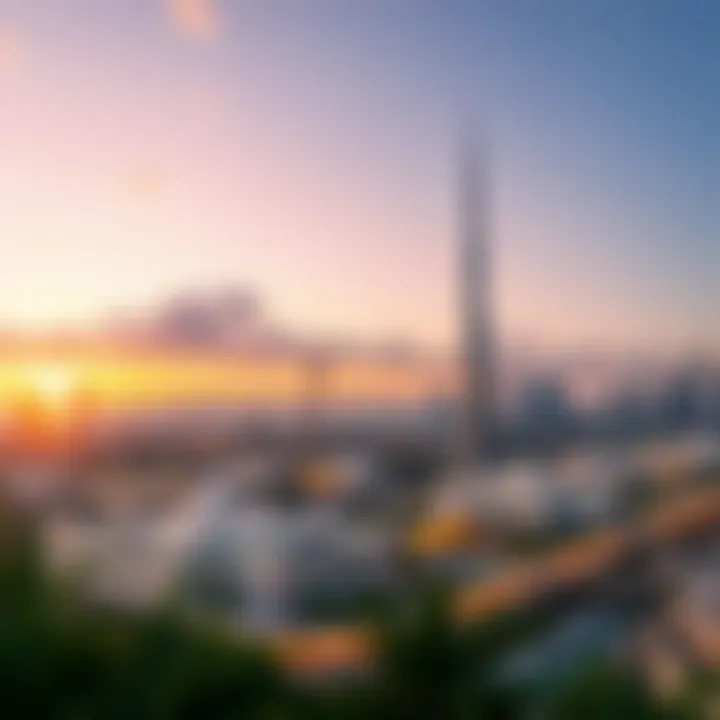
Intro
Ramadan in Dubai is not just a month of fasting; it's an experience steeped in rich tradition and community spirit. As the sun dips below the horizon each day, the city transforms into a vibrant hub of gatherings, prayers, and feasting. Iftar, the meal that breaks the fast, holds immense cultural significance, offering a chance to connect with family, friends, and even strangers. This guide aims to illuminate the precise timings of iftar during Ramadan, alongside the local customs and communal practices that define this sacred month. Whether you are a resident or a visitor, understanding the intricacies of iftar in Dubai will enhance your experience, allowing you to fully immerse yourself in the joyous celebrations.
Get ready to explore the essence of iftar; from the sights, sounds, and mouth-watering dishes that fill the air with tantalizing aromas to the communal experiences that bring people together. Each evening during Ramadan, as the call to prayer echoes through the bustling streets, the anticipation of iftar brings residents to their feet, gathering at homes, mosques, and public spaces.
This guide will not only provide you with practical information about iftar timings but also insights into the best places to experience it. Moreover, understanding the significance of this meal in the context of Dubai’s diverse culture will enrich your visit, making it a profound journey into the heart of the city’s traditions.
Understanding Iftar in Dubai
Iftar, the meal that breaks the fast during the holy month of Ramadan, holds profound significance in Dubai's cultural and religious fabric. Delving into this aspect reveals not just a meal but a communal event that goes beyond mere nutrition. The act of coming together at sunset to share food fosters social bonds and nurtures a strong sense of community among the diverse residents of this bustling city.
Definition and Significance
At its core, iftar is the evening meal that Muslims enjoy after a day of fasting. It marks the end of a lengthy fast observed from dawn until sunset. During Ramadan, this meal assumes a role much greater than that of sustenance; it embodies the spirit of generosity and belonging. Families and friends gather at tables piled high with dates, traditional dishes, and drinks to share in a collective experience, signaling not only the cessation of fasting but also a time for reflection, gratitude, and connection.
The significance of iftar extends beyond just a meal. It serves as a reminder of the values of empathy and charity central to Ramadan, encouraging individuals to think of those less fortunate. Many affluent individuals sponsor iftar gatherings for the less fortunate, embodying the idea of giving and community cohesion.
Cultural and Religious Context
In Dubai, which boasts a rich tapestry of cultures, iftar serves as an intersection for various traditions. The city's highly diverse population includes a blend of local Emiratis, expats, and tourists. Each group brings its culinary influences to iftar, resulting in a vibrant melting pot of flavors and traditions.
Religion plays a critical role in shaping the practices surrounding iftar. Traditionally, at the call to the Maghrib prayer, individuals break their fast with dates and water, following the practice of the Prophet Muhammad. This ritual is often accompanied by prayers and a moment of reflection. The communal atmosphere is bolstered by the fact that many mosques offer public iftar meals, welcoming individuals from all walks of life.
In summary, understanding iftar in Dubai requires recognizing its multifaceted nature—it's an act of worship, a family gathering, and a community celebration. As the sun dips below the horizon, tables fill with people, laughter fills the air, and the essence of Ramadan becomes palpable, knitting together a community through shared experience.
Live Iftar Timing
In Dubai, the timing of iftar holds great significance. It marks the end of a day’s fast during Ramadan, bringing food and community together. For many, these moments are not just about breaking bread; they symbolize a reconnection with faith, family, and culture. Knowing the exact timing of iftar is crucial for proper observance and helps avoid any confusion that might arise due to varying prayer times.
Official Prayer Times
The iftar moment is closely tied to the Maghrib prayer, which occurs right after sunset. In Dubai, the official prayer times are provided by various Islamic authorities and can be accessed through several platforms, such as the Dubai Islamic Affairs and Charitable Activities Department website. The iftar time can shift slightly from day to day as the sun sets at different times throughout the month of Ramadan.
To provide an illustration:
- Day 1: 6:22 PM
- Day 10: 6:25 PM
- Day 20: 6:30 PM
- Day 30: 6:36 PM
These variations, while seemingly minor, influence the daily rhythms of Ramadan life. To ensure adherence to the accurate timing, locals and expats alike often synchronize their watches with the mosque call to prayer or use reliable apps that provide updates on the timings.
Variations Across the Month
As Ramadan progresses, the timing of the iftar meal transforms, reflecting the gradual changes in daylight. This means day by day, the experience of preparation and gathering can vastly differ. In the early days, when daylight persists longer, families find themselves anticipating the iftar with excitement that transforms into a comforting routine as the month unfolds.
"Understanding when to break the fast is vital; it’s not just about food; it’s about timing our spirituality with the daily rhythm."
Diving deeper, it’s interesting to note how this influences communal activities. In the first few days, neighborhoods are buzzing with energy, with many community iftar tents being organized. As the days wear on, while still lively, the tone may shift to a more reflective one.
Additionally, as the holy month nears its end, the iftar timing starts to encapsulate a sense of urgency and closeness, as many are eager to maximize their spiritual engagement before Ramadan concludes. This leads to gatherings becoming more intimate, with people opting for home-cooked meals versus dining out, strengthening familial bonds.
In sum, knowing the live iftar timing serves as an essential anchor in the diverse tapestry of Ramadan in Dubai. These rites and customs, centered around time, enhance not only the act of fasting but also foster connections within the community.
Community Practices and Gatherings
During Ramadan, the concept of community practices and gatherings takes on significant importance in Dubai. It's not merely about breaking fast but reinforcing bonds among families, friends, and even strangers. This period transforms everyday moments into occasions of warmth, generosity, and mutual respect. The collective act of sharing an iftar fosters a spirit of unity, transcending cultural and social boundaries, and allowing everyone—be it locals or expats—to come together and experience the essence of Ramadan.


Public Iftar Events
Public iftar events are a hallmark of Ramadan in Dubai. These gatherings are often held in parks, public squares, and even within the walls of mosques, accommodating hundreds of participants eager to break their fast together. These events showcase the true spirit of togetherness, allowing attendees to share not just food but stories, laughs, and a sense of belonging.
The beauty of public iftar lies in its open-door policy; everyone is welcome, whether you’re a resident or just visiting. For instance, the big gatherings in Dubai’s Festival City or Burj Park draw crowds that spill out like a wave of grateful souls, each ready to forgo their individual meal in favor of a shared experience. Families often bring blankets and sit on the grass, while groups of friends gather around long tables laden with dates, water, and traditional dishes.
Public iftar events serve as an open invitation, promoting inter-cultural dialogue and understanding.
Additionally, these events often feature local musicians and traditional entertainment, creating a festive atmosphere. The festivities aren't just about the food; they encapsulate the joy of being part of a larger community celebrating Ramadan together.
Family and Neighborhood Gatherings
Equally essential are family and neighborhood gatherings. These smaller, intimate affairs allow for a deeper connection between loved ones and neighbors. Traditionally, families start preparing meals well before sunset, engaging all members in creating a feast that might include dishes like samosas, harees, and fattoush.
In many communities, sharing this meal becomes a ritual that reinforces ties and provides space for shared gratitude and reflection. Neighbors often invite each other over, creating a vibrant tapestry of friendship and social interaction. This practice enhances a sense of belonging and encourages acts of generosity, as families may prepare extra plates to share with those who may not have family close by.
In some neighborhoods, it’s common to see communal tables set up outside family homes, where people from all walks of life are invited to eat together. If you are new to the area, participating in such gatherings can provide a genuine sense of community; it’s a chance not just to savor delicious food but also to forge meaningful connections.
To put it succinctly, whether through large-scale public events or cozy family meals, the community practices surrounding iftar in Dubai resonate with the ethos of hospitality and fellowship typical of Ramadan. Both public and family gatherings showcase the beauty of this holy month, inviting all to partake in the blessings it has to offer.
Culinary Aspects of Iftar
Iftar is much more than just a meal; it is an elaborate ritual that embodies the spirit of Ramadan. In Dubai, the culinary aspects of iftar reflect the cultural diversity of the city. From vibrant traditional dishes to modern interpretations, the food served at iftar serves as a medium for social interaction and community bonding. Understanding this culinary landscape helps appreciate how food plays a pivotal role in this holy month.
Traditional Dishes
The essence of iftar lies in its traditional dishes, which are often steeped in history and cultural significance. Dates, for instance, are one of the first foods consumed to break the fast. Rich in nutrients and easily digestible, they help replenish energy quickly. Traditionally, they are combined with fresh fruits and sweet beverages like Qamar al-Din (apricot juice) or Jallab (a drink made from dates, tamarind, and raisins), making the meal both wholesome and refreshing.
Among the savory options, samosas stuffed with spiced potatoes or minced meat stand out and are beloved by many. Their crispy texture provides a delightful crunch to start off the meal. Another staple is harira, a soup rich with legumes, meat, and spices, often enjoyed in Arab households. It’s warming and nourishing, perfect after a long day of fasting.
Family gatherings during iftar often feature elaborate platters of biryani, fragrant rice cooked with spices and meat. As each dish is served, it brings with it a sense of togetherness and shared heritage, making the gathering more than just about the food.
Modern Twists on Classic Meals
While tradition holds a significant place, many restaurants in Dubai take pride in offering modern twists on these classical meals. The fusion of international flavors with local cuisines provides a unique dining experience for locals and expatriates alike. For instance, you might encounter samosa chaat, where the crispy samosas are topped with yogurt and tangy chutneys, creating a delightful explosion of flavors.
Moreover, restaurants have started experimenting with gourmet dates stuffed with nuts, cream cheese, or even chocolate, appealing to those looking for a contemporary snack to break their fast. Grilled kebabs served with various dipping sauces and wraps showcase how traditional grilling techniques can be harmonized with global dishes.
One must also mention the pastries, such as kunafa or basbousa, which have seen creative variations. Some eateries are offering these desserts with unexpected fillings or toppings, like pistachio ice cream or edible flowers, turning a time-honored favorite into an Instagram-worthy delight.
Embracing this evolving food culture during Ramadan, the culinary landscape of Dubai showcases the interplay between tradition and innovation, teaching us that dishes can be both rooted in history yet ever-evolving.
"Food is a symbol of love when words are inadequate."
Knowing the significance of these dishes offers a deeper appreciation for iftar, transforming a simple meal into a rich cultural experience.
Best Places to Experience Iftar
Experiencing iftar in Dubai goes beyond just the food. It’s an intricate blend of culture, community, and ambience, offering both residents and visitors an opportunity to immerse themselves in local traditions. Choosing the right place to break your fast can significantly enhance your Ramadan experience. Selecting the ideal venue involves considering not just the food but also the atmosphere, the people, and the warmth of hospitality.
Top Restaurants Offering Iftar
Dubai is home to a plethora of restaurants that provide a unique twist on traditional iftar dining. Some establishments focus on providing authentic dishes, while others aim to craft a culinary experience that combines elements from various cultures. Here are a few noteworthy options:
- Arabian Tea House: Known for its cozy atmosphere and traditional Emirati dishes, this restaurant offers a range of hearty meals served with authentic drinks like Arabic coffee and mint tea. The unique charm of its setting makes it a perfect place for families or groups of friends to come together.
- Eauzone: Located within the luxurious One&Only Royal Mirage, Eauzone offers a serene waterfront setting. Its diverse menu includes international specialties with an Arabic flair, inviting guests to enjoy both the sunset and the sumptuous meal that follows.
- At.mosphere: For those looking to savor iftar at a great height, At.mosphere in the Burj Khalifa is quintessential. The views from the 122nd floor are unparalleled, and the menu is equally impressive, featuring gourmet delicacies that redefine upscale dining experiences during Ramadan.
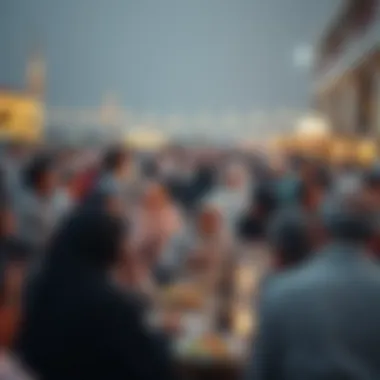
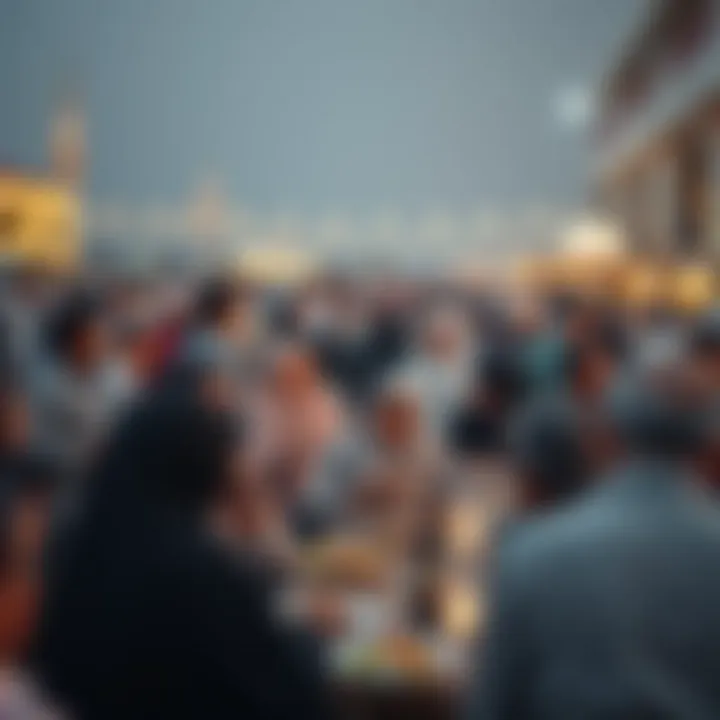
“Breaking bread is the oldest expression of community. In Dubai, this expression takes many forms.”
Dining in these establishments not only satisfies hunger but also offers a shared experience that connects people. The atmosphere during iftar is lively, filled with joyous chatter as families and friends gather together.
Community Iftar Tents
Beyond restaurants, community iftar tents pop up all over Dubai. These tents offer a more communal experience, where people from various backgrounds gather to share their meals. The significance of community iftar tents lies in the spirit of generosity and hospitality exemplified during Ramadan.
- Sheikh Mohammed Centre for Cultural Understanding: This tent is not just about food; it’s also a platform for cultural exchange. Visitors can learn about local customs and engage in discussions while enjoying traditional dishes prepared on-site.
- Various neighborhood tents: Many local communities set up iftar tents on the streets. These tents are usually open to anyone, regardless of religious background, reinforcing the ideals of sharing and inclusivity. Dining in these tents is often marked by lively conversation, laughter, and a real sense of togetherness.
- Corporate and non-profit sponsored initiatives: Organizations often sponsor large tents to facilitate iftar for those in need, bringing people together in a gesture of kindness and community spirit. This exemplifies the idea that Ramadan is a time for giving, whether to family and friends or to the less fortunate.
Choosing to break your fast in these settings not only feeds the body but nourishes the soul through shared experiences. The combination of traditional food, cultural insights, and the ambiance of companionship makes iftar a meaningful event throughout Ramadan in Dubai.
Navigating Iftar in Dubai
When it comes to experiencing the essence of Ramadan in Dubai, knowing how to navigate the iftar rituals is crucial. This involves understanding the local customs, the significance behind these traditions, and how to participate meaningfully. For both residents and newcomers, this knowledge not only enhances the experience but also fosters deeper connections with the community.
The atmosphere during iftar in Dubai is distinctly vibrant. The city transforms as individuals and families gather to break their fast, creating a shared experience that is both intimate and communal. Navigating this event can elevate your own understanding of hospitality and generosity, which are pillars of both Ramadan and Emirati culture.
Understanding Local Etiquette
In Dubai, local etiquette during iftar holds significant weight. First and foremost, timing is essential. Many begin their iftar meal right at sunset, and it is respectful to wait for the call to prayer before indulging. Attending an iftar, especially if you are a guest, means embracing the customs of your hosts.
Some key points of etiquette include:
- Dress Code: While Dubai is modern, a touch of traditional wear is appreciated during Ramadan. Think modest clothing.
- Dining Order: It is a custom to allow the elders to start the meal first. This displays respect and appreciation for the family unit.
- Using the Right Hand: In Emirati culture, it's customary to eat with the right hand, as the left is considered less clean.
In many homes or gatherings, it’s also common to say a brief dua (prayer) before the meal, thanking Allah for the food. Engaging in these practices not only makes one feel welcome but shows appreciation for local customs.
What to Bring to an Iftar Gathering
If you’re invited over for iftar, it’s nice to consider bringing something along. Though guests are generally welcomed with open arms, a small gift can further symbolize goodwill and respect for your hosts.
Here are some thoughtful items you might consider bringing:
- Dates: A traditional iftar staple; they are often enjoyed with coffee or tea.
- Sweets: Pastries like kunafa or baklava are generally well-received and can add sweetness to the meal.
- Drinks: Juices or traditional drinks such as Qamar al-Din (apricot juice) can be a delightful addition and are often enjoyed after fasting.
- Fresh Fruits: Seasonal fruits are light and refreshing, making them ideal for breaking the fast.
Bringing a gift showcases your respect for the inviting household, enhancing communal ties during this sacred month.
Ultimately, navigating iftar in Dubai revolves around engaging fully with the local traditions while respecting the sanctity of the month of Ramadan. Knowing the etiquette and what to bring can turn an ordinary gathering into an enriching experience.
Social Media and Iftar
In today’s interconnected world, social media plays a pivotal role in shaping how we experience cultural practices, including iftar during Ramadan. The digital landscape has completely transformed the way individuals share their experiences, find community resources, and stay updated on important events related to Iftar. For both locals and expats, platforms like Instagram, Twitter, and Facebook serve as invaluable tools for bringing people together, especially in a city as diverse as Dubai.
Real-Time Updates
One significant advantage of social media during Ramadan is the ability to receive real-time updates on iftar timings and events. Many mosques and community centers in Dubai utilize their social media platforms to broadcast precise prayer times, making sure everyone is in sync. Here are some ways you can engage with updates:
- Follow Local Mosques: Major mosques in Dubai, such as the Sheikh Zayed Grand Mosque, often provide timely updates about iftar and prayer schedules through their social media accounts.
- Community Groups: Joining local Facebook or WhatsApp groups can be a great way to stay informed about spontaneous iftar events or community gatherings.
- Event Pages: Many restaurants and hotels post about their iftar offerings, ensuring you never miss out on special menus or collaborative pop-up events.
Such timely notifications not only enhance your iftar experience but also foster a sense of belonging in a city bustling with many different cultures. Knowing when to break your fast, and where to gather can significantly enrich the communal atmosphere that is characteristic of Ramadan.
Sharing Iftar Experiences
Social media serves as a platform for sharing not just updates but real connections as well. Documenting and sharing your iftar experiences can create a sense of community and encourage others to join in. Here are ways to share your unique Iftar moments:
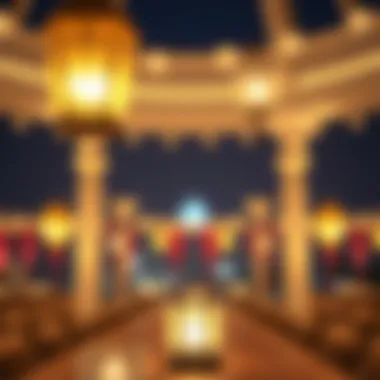
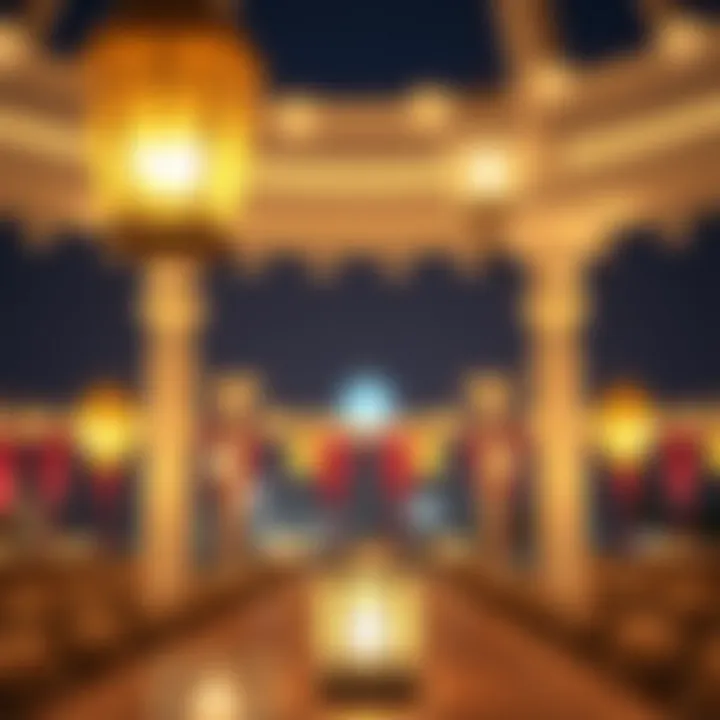
- Photos of Food: Posting mouth-watering images of traditional dishes can tempt more people to explore the local dining scene. Don't hesitate to tag the establishment; they often share your posts, enhancing visibility.
- Live Videos: Sharing live moments during iftar allows friends and families, even those far away, to experience the warmth and joy of breaking bread together.
- Hashtags: Utilizing hashtags like #IftarDubai or #Ramadan2023 can help others discover your posts and promote a wider community sharing their own pictures and stories.
Sharing your personal experiences also invites others to partake in discussions about traditions, fostering a richer understanding and appreciation of the diverse customs surrounding iftar.
"Communicating through social media during Ramadan allows individuals to document not just their meals but their collective cultural heritage."
In summary, social media is a central player in enhancing Iftar experiences in Dubai, ensuring it's not just about food but about community, connection, and understanding.
By utilizing these platforms thoughtfully, residents and visitors alike can navigate the vibrant tapestry of Iftar celebrations, making their time in Dubai all the more meaningful.
Iftar and Hospitality
Throughout the month of Ramadan, the concept of hospitality takes on special meaning in Dubai, where Iftar becomes a central element of social and family life. The time when the sun dips below the horizon marks not just the end of a day of fasting, but also the beginning of a cherished tradition of breaking bread together. This is a time when friends and family gather, bringing a sense of community and warmth that truly embodies the spirit of generosity that Ramadan promotes.
Iftar, at its core, is more than just a meal; it represents an opportunity for connection, reflection, and sharing. As the sun sets, it is customary for families to invite one another over, where they break their fast together, reinforcing bonds and fostering a sense of belonging. In a bustling city like Dubai, where many cultures converge, this shared meal becomes a bridge, connecting various traditions and backgrounds.
This approach to hospitality during Iftar can be seen in various aspects of daily life:
- Inclusivity: Inviting neighbors or colleagues to join can turn a simple meal into a rich cultural exchange, allowing diverse cuisines and customs to meld.
- Generosity: The act of hosting an Iftar is often seen as a reflection of one’s ability to give and share, deepening one’s connection to the community.
- Tradition: Each family might showcase their unique recipes passed down through generations, celebrating their heritage while also embracing others.
"True generosity is not limited to material gifts; it extends to the sharing of time, stories, and experiences."
One notable characteristic of Iftar gatherings is the broad range of people who participate. Emiratis and expatriates come together, blurring the lines between cultures, with each party bringing their own customs to the table. In doing this, they create a tapestry of flavors and traditions that enrich the experience for all.
Moreover, local businesses and community organizations play an integral role, hosting public Iftar events that welcome anyone to join regardless of their background. This spirit of openness encourages a more intimate relationship among the residents of Dubai, inviting everyone to partake in the blessings of the month.
In summary, the act of coming together for Iftar is woven into the fabric of Dubai’s social life. The hospitality exhibited during this holy month goes beyond mere etiquette; it embodies values of empathy, kindness, and community that resonate with both tradition and modernity, serving as a reminder to cherish the bonds that unite us all.
The Concept of Generosity during Ramadan
During Ramadan, generosity transcends material concerns. It manifests in actions, in the willingness to share, and in the heart behind the offerings. The act of giving—be it food, time, or love—becomes not just an obligation but an inherent part of the month’s essence.
In Dubai, this is particularly visible in the abundance of discounts and promotions offered by hotels, restaurants, and businesses eager to contribute to the spirit of giving. Many establishments provide complimentary Iftar meals to those in need, ensuring that no one breaks their fast alone or lacks provisions to celebrate. This sense of collective responsibility cultivates an atmosphere where generosity flourishes and encourages everyone to partake in charitable actions.
- Cultural Practices: In many households, it is common to prepare a larger meal than necessary. Leftovers are often distributed to neighbors or those less fortunate.
- Charitable Initiatives: Numerous organizations in Dubai collect funds and food donations specifically to ensure that families facing hardships are not forgotten during this holy time.
This idea of generosity is crucial not merely for fulfilling a cultural duty but for reinforcing social cohesion, making it imperative in a cosmopolitan landscape like Dubai. It creates a shared understanding that transcends individual needs, fostering a feeling of unity.
Inviting Guests for Iftar
Inviting guests for Iftar is a significant act of hospitality that manifests warm traditions deeply rooted in the practice of Ramadan. Each invitation is a way of inviting others to partake in a moment of gratitude and connection that goes beyond the food served.
When extending an invitation, it is typical to consider the preferences and dietary restrictions of others. Such consideration not only reflects hospitality but also cultural awareness. For instance, vegetarians or those observing halal practices may appreciate when their hosts accommodate their needs with careful menu planning.
Moreover, the timing of these invitations can vary; some families may host a larger gathering, while others might prefer intimate dinners, depending on the relationships they wish to nurture. The choice of location also plays a role—whether it's in a home, a community tent, or even at a restaurant, each setting embraces the tradition differently.
A few pointers to keep in mind when inviting guests for Iftar include:
- Personal Touch: A handwritten invitation or a simple phone call makes the invite feel more genuine.
- Encouraging Contributions: Hosting guests often leads to a potluck-style gathering, where each participant brings a dish, adding variety and personal significance to the feast.
- Setting a Comfortable Atmosphere: Creating a welcoming environment with appropriate décor adds to the experience, making it memorable for everyone involved.
In the heart of Dubai, extending invitations during Iftar embodies the city’s rich, multicultural tapestry. It’s a time for reflection, appreciation, and connection where hospitality flourishes dynamically, promoting ties that last beyond the fleeting month of Ramadan.
Closure
As we wrap up this in-depth exploration of iftar in Dubai, it's essential to recognize the profound impact that this tradition has on the cultural fabric of the city. Iftar is far more than just a meal to break the fast; it is a pivotal moment that encapsulates a sense of community, family, and spiritual reflection.
Embracing Cultural Traditions
To truly appreciate iftar, one must understand its role as a cultural cornerstone during Ramadan. Ramadan, observed by millions across the globe, is a month of fasting, prayer, and reflection. In Dubai, this month takes on a unique flavor, infused with local customs and traditions. Families gather, not only to satisfy their appetites but to reinforce bonds and share moments of gratitude.
The meal often begins with dates and water, which harkens back to the practices of the Prophet Muhammad. This simple act serves as a beautiful reminder of faith, humility, and clarity of purpose. The culinary landscape is vibrant, with traditional Arabic dishes and contemporary interpretations shared widely amongst friends and family.
The Role of Iftar in Dubai's Community
Iftar plays a transformative role in fostering social connections within Dubai’s diverse population. Here, in a cosmopolitan melting pot where many cultures converge, sharing an iftar meal transcends barriers. It offers an opportunity for dialogue and understanding amongst different nationalities. By hosting iftar events, whether at lavish banquet gatherings or intimate home dinners, residents contribute to the rich tapestry of communal harmony. Local organizations often set up community iftar tents, encouraging participation from all walks of life. It can be said that during Ramadan, the streets of Dubai come alive with a spirit of togetherness that showcases the best of human connection, promoting values such as generosity and kindness.



